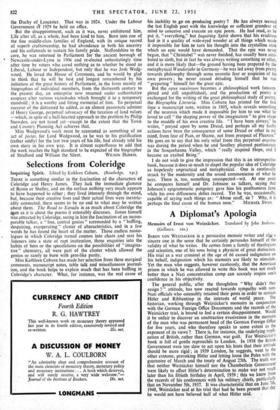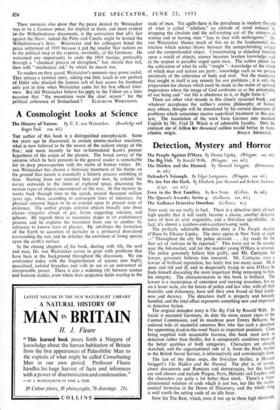A Diplomat's Apologia
Memoirs of Ernst von Weizsacker. Translated by John Andrcus. (Gollancz. 16s.)
BARON VON WEIZSACK ER is a persuasive memoir writer and alsp a sincere one in the sense that he certainly persuades himself of the validity of what he writes. He comes from a family of theologians and scientists, one of his sons being a physicist of great distinction. His trial as a war criminal at the age of 66 caused indignation on his behalf, indignation which his memoirs are likely to stimulate. Yet the man who suggests, however cautiously, that the American prison in which he was allowed to write this book was not much better than a Nazi concentration camp can scarcely inspire one's confidence in his objectivity.
The general public, after the thoughtless " Why didn't they resign ? " attitude, has now reacted towards sympathy - with non- Nazi officials who ostensibly retained their posts in order to restrain Hitler and Ribbentrop in the interests of world peace. The historian, working through Weizsacker's memoirs in conjunction with the German Foreign Office Documents and the records of the Weizsacker trial, is bound to feel a certain disappointment. Would' it be unfair to discover an unattractive evasiveness in the memoirs of the man who was permanent head of the German Foreign Office for five years, and who therefore speaks to some extent as the exponent of its views ? There is, for instance, the underlying impli- cation of British, rather than German, war guilt. For Weizsiicker's book is full of gentle reproaches to London. In 1938 the British Government were too slow to act upon his hints that their attitude should be more rigid ; in 1939 London, he suggests, went to the other extreme, provoking Hitler and letting loose the Poles with the guarantee of March and the treaty of August 25th. The truth was that neither Weizsacker himself nor the Chamberlain Government were likely to affect Hitler's determination to make war not much later than his fiftieth birthday in April, 1939 ; this we know from the records of his conferences with his military chiefs, particularly that an.November 5th, 1937. It was characteristic that on June 7th, 1948, Weizsacker said at his trial that had he been present that day
he would not have believed half of what Hitler said. •
These memoirs also show that the peace desired by Weizsacker was to he a German peace, for implicit in them, and more evident irr the Wilhelmstrasse documents, is the conviction that all's fair against the Slays ; indeed the Poles and Czechs might be termed the Wilhelmstrasse's Jews. Weizsacker and his colleagues hated the peace settlement of 1919 because it put the smaller Slav nations on to the political map at the expense, inevitably, of the Germans. He welcomed any opportunity to undo the 1919 treaties, preferably through a " chemical process of disruption," but, should that fail, then with " mechanical aid," by which he meant war.
To readers on their guard, Weizsiicker's memoirs may prove useful. They retrace a familiar story, adding one little touch to our portrait of Hitler who plucked the famous tuft of hair across his forehead only just in time when Weizsacker came for his first official inter- view. But did Weizsacker believe hisieply to the Fiihrer on a later occasion that " the mountains were the chief reason " for the political coherence of Switzerland ? ELIZABETH WISKEMANN.



















































 Previous page
Previous page